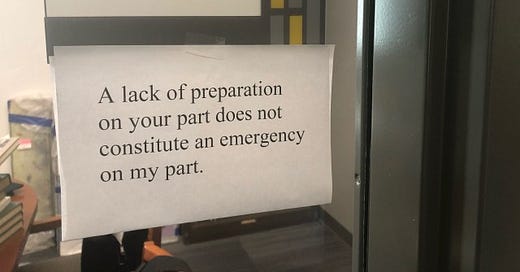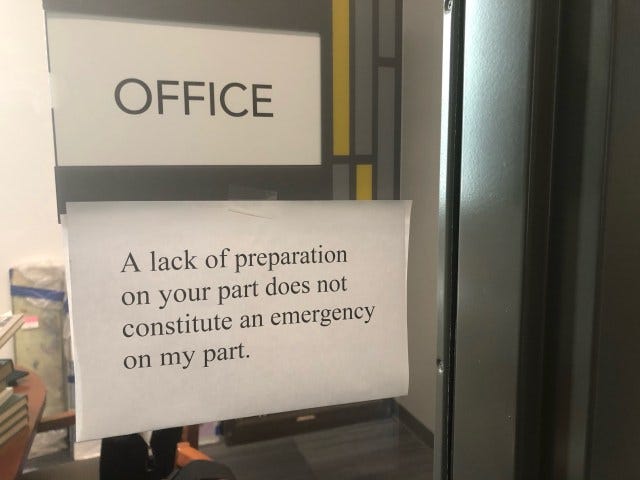A sign that we don’t care
When I was in grad school, down the third floor hallway at the other end of Ramaley Hall, was the office of a professor who did a lot of undergraduate advising. He had a sign posted on his office door:
I hadn’t heard this particular phrase before.
Since I saw this sign in 1994, I’ve walked past a lot of offices, and I’ve seen this sign plenty of times. Maybe it’s on a door at your own institution. I also saw it last week in a posting on a higher education group in Facebook. I’ve worked in a place that embraces this kind of ethos. Earlier in my career, in a bout of Stockholm syndrome, I might even have said this myself.
Nowadays, when I see one of these signs, I identify it as a red flag, and mentally translate it as: “Inside this door resides a person who doesn’t care.”
What’s wrong with this sign? Does it speak an untruth? Well, no, I bet this is how most of us feel. Frankly, it’s not healthy for me or my students for me to go into crisis mode every time a student belatedly discovers that they needed to do something that they haven’t done.
But it’s not necessary to point out unhelpful truths. It doesn’t help to rub someone’s nose in it before you even get to share words.
The thing about this sign is that it sends its message to every single person walking down the hallway. It actually sends multiple messages. It says:
“I care about my time more than I care about your problems.”
“Irresponsible students bother me so often I had to put up a sign to let them know that I won’t hurry on their behalf.”
“This university is so insensitive to your concerns that they gave tenure to a guy like me who isn’t student-centered, and then they put me in charge of supporting students.”
“When you walk through this door, there is an assumption of guilt and I’m not going to really care about your problems, and I’ll deal with it when I get around to it.”
Civil society is built on mutual respect and empathy. Even if you don’t buy into that concept, we are more effective as teachers when we earn and maintain the respect of our students. When we’re teaching, our job is to make sure that students learn. And it’s hard to focus learning in an adversarial atmosphere that operates on compliance and fear.
Let’s say you’ve got a lot of students who failed to plan, and they regularly come to you with personal crises. How about you change your note to say, “We run a busy office, and we will try to address your concerns promptly.” That’s not exactly welcoming, but at least it doesn’t prejudge every person who knocks on your door.
I’m just spitballing here, but maybe you could address the root of the problem by thinking about why so many students aren’t planning well enough? Maybe you could develop an advising agenda that identifies these problems before they emerge? Maybe you could post a note pointing students towards advising resources that will help prevent these problems?
I suppose the kind of person who posts such a sign might think that they’re doing a favor to students by teaching them some kind of life lesson. Or perhaps they think that they are being impartial and dispassionate to protect their time and minimize the expenditure of emotional labor. But really, please recognize that this sign is anything but impartial and dispassionate. It’s a sign that you don’t care. While we don’t need to rush into crisis mode every time a someone else’s problem falls into our laps, can’t we be at least kind?
People say that being kind costs us nothing. I don’t think that’s true. It takes work to be kind. I just think it’s worth it. But if you’re going to apply for a job in a university that involves working with students, then, dammit, it’s your job to not be an ass.
Our most valuable asset is our own time. We should use it well. Which means that, if we accept a job involving supporting students, that we take a few more moments to be supportive.



